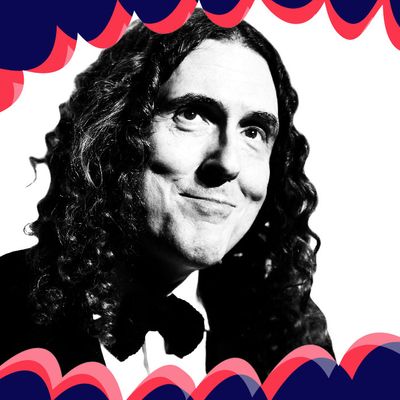
In 2014, almost four decades into his career, Weird Al Yankovic released his 14th record, Mandatory Fun, to unexpected fanfare, earning his first No. 1 album and dominating the internet news cycle with new videos. But should it really have been so unexpected? It’s hard to think of a comedian or even a musician, for that matter, who has maintained pop-culture relevance as long as Weird Al has. Every generation has their defining Weird Al parody, from “Eat It” to “Smells Like Nirvana” to “White & Nerdy” all the way up to Mandatory Fun’s biggest hit, “Word Crimes.” Weird Al is an institution.
You don’t get a career like that by accident. On this week’s episode of Vulture Good One podcast, Yankovic walks us through the meticulous and methodical process of writing “Word Crimes,” his grammar nerdist parody of Pharrell and Robin Thicke’s “Blurred Lines.” He explains how he writes for a character, starts with a song title, and how the legal trouble surrounding “Blurred Lines” affected him.
Listen to the episode and read an excerpt of our discussion below. Tune in to Good One every Monday on iTunes, or wherever you get your podcasts.
Do you operate with a sort of mission statement? Is it a conscious decision, Oh, I’m Weird Al and this is how this fits into the universe of the songs that I do?
Most of my songs are a sort of Randy Newman-esque, untrustworthy narrator thing, which is difficult for “Word Crimes” because there’s a lot of me in that character. I personally am a bit of a grammar nerd and bad grammar irritates me, but I’m not quite as pedantic or prescriptivist as the singer in that song. I don’t like bad grammar, but I don’t think I’d ever hit somebody over the head with a lead pipe for bad syntax.
The character changes per song?
That’s correct, yeah. People freak out sometimes because, “How could you write a song like ‘My Bologna’ when you’re a vegetarian?!” Well, these are not all autobiographical songs. I don’t behead people or do most of the things the characters in the songs do.
There’s a meanness to this song that I think people don’t necessarily associate with the rest of your songs. Some of the songs there definitely are on that side.
It’s an exaggeration for the sake of comedy. I’ve been taken to task a lot because a lot of teachers tell me they would have liked to use the song as teaching material in their schools, but it’s just too mean-spirited. But I didn’t write it really to be part of a classroom curriculum. It’s meant to be comedy and part of my perception of it is for me to be over the top with the character. Like, just to do grammar lessons is okay, but the character is so intense that he threatens people with violence for bad grammar, that kind of pushes it over.
That is more than just the one joke of we’re changing the words into other words.
Yeah, part of the comedy is a guy that’s just so intense about grammar.
It’s parodying people who are both bad at grammar and people who care too much about grammar.
Well, that’s exactly it. A lot of my songs are two-edged that way. I did a song called “Don’t Download This Song,” where both sides are mad at me and both sides are fans. It made fun of the people that were downloading illegally as well as the people that were prosecuting people downloading illegally. It’s the same thing with “Word Crimes.” It’s obviously making fun of people that have bad grammar, but also making fun of people that make fun of people that do have bad grammar.
As is often the case, “Word Crimes” is a parody and not a satire. Why is that?
Satires on that particular song had been done to death basically. I’ve done satires on a small handful of occasions with Nirvana and Billy Ray Cyrus and Lady Gaga, maybe one or two others. But particularly for this one, I kind of felt like that ground had been well-trodden before and I just thought I had to go a whole different direction.
Though, it’s not satire and obviously there’s a contrast of what the original song is and what the parody is. What were you hoping with that?
I love to get a really bizarre juxtaposition and a lot of my humor comes from glorifying the mundane. I thought it was a really sweet thing for me to be able to take that song, which is pretty sexually charged, and turn it into a song about proper grammar usage.
Does Pharrell and Robin Thicke losing the court case for copyright infringement to the Marvin Gaye estate affect you in anyway?
Not directly. I have to assume that whatever royalties I’ve paid them in the past probably got given to the Marvin Gaye estate in the settlement. And going forward, maybe it just goes directly to the Marvin Gaye estate. I honestly don’t know. That’s something for the lawyers to bicker about.
You’re not, like, asking your accountants, “So, where is this money going?”
No. [Laughs.]
To be fair, I didn’t even realize that once you start parodying that the original songwriters get any money.
Yeah, we negotiate a deal for every single parody. Generally, the original songwriters will keep the publishing and we’ll split the writer’s royalties. They wind up making more money than I do, but that’s fair, I think.
There are probably cases where people made more money on your parody than they did on the original song.
I don’t know about that.
Some cases.
You think? I don’t know [laughs].


